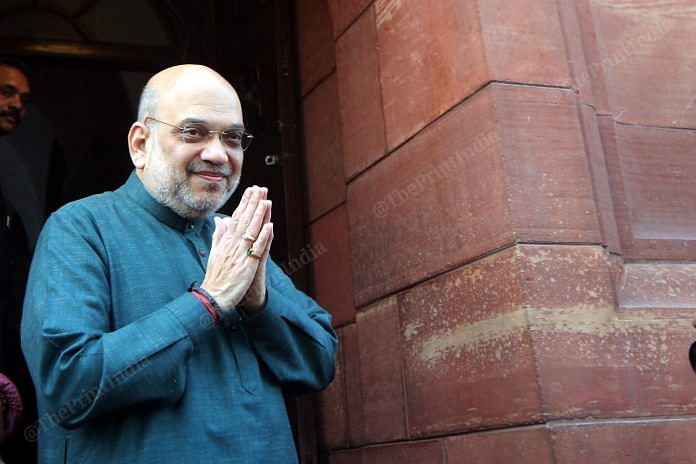Every few years, there are reports of violent protests in Karnataka’s Belagavi, burning of the state flag in the neighbouring border districts of Maharashtra while controversial statements by politicians add fuel to the fire.
At the heart of these protests is a six-decade-old conflict. States were re-organised on linguistic grounds in 1956 and Belagavi, then Belgaum, was given to the newly-formed Mysore that later became Karnataka, against the wishes of many from the present-day Maharashtra. Since then, Maharashtra has claimed that the predominantly Marathi-speaking 814 villages along the border with Karnataka and Belgaum should be made a part of its territory.
For decades since then, the conflict has festered and served as a political ammunition for parties in the two states. And no sincere efforts have been made by any of the two main national parties—the Bharatiya Janata Party (BJP) and Congress—to find a solution. The fact that the dispute has been in the Supreme Court since 2004 makes provocative political comments and street violence even more pointless. A protracted court battle does leave space for frustration to grow on the ground.
Since last month, political grandstanding has once again brought the border row to dominate the discourse in Maharashtra and Karnataka. Tensions heightened this week even as the winter session of the two state assemblies is underway at Nagpur (Maharashtra) and Belagavi. And that is why Belagavi is ThePrint Newsmaker of the Week.
Also read: Who are Panchamasali Lingayats & why they’re so important in Karnataka politics
The trigger
Last month, Maharashtra Chief Minister Eknath Shinde extended a pension scheme for freedom fighters to the disputed border areas, needling Karnataka. Similarly, Karnataka CM Basavaraj Bommai’s comments about merging parts of Maharashtra such as Sangli’s Jat taluka and Solapur’s Akkalkot taluka with Karnataka drew angry responses.
This was followed by clashes at the Maharashtra-Karnataka border, with vehicles from Maharashtra stopped from entering the neighbouring state. There were also incidents that saw Karnataka state transport buses blackened in Maharashtra. Two ministers from Maharashtra—BJP’s Chandrakant Patil and Shamburaj Desai from the Shinde-led Balasahebanchi Shiv Sena—called off a planned visit to Belagavi, drawing angry responses from the opposition in Maharashtra.
What is peculiar about these clashes is that the sparring is between two BJP-ruled states, with the party being in power with Balasahebanchi Shiv Sena in Maharashtra and by itself in Karnataka. Moreover, the BJP is also helming the Union government.
Both states sought Union Home Minister Amit Shah’s intervention. But Shah simply asked the two sides to solve the issue in court, constitutionally, rather than on the streets, and show restraint.
Despite Shah’s appeal, the controversial comments by leaders of both states, aimed at needling each other, haven’t stopped. On Wednesday, Maharashtra minister Shamburaj Desai said the state will have to rethink about sharing water with Karnataka if “irresponsible remarks” by Karnataka’s political leaders continue. The Karnataka assembly on Thursday passed a resolution that the state will not cede any of its land to Maharashtra.
The party leadership, meanwhile, has made no further comments on the dispute, clearly indicating that the BJP doesn’t want to involve itself in the issue. Speaking at ThePrint Political Adda, Madhav Bhandari, BJP vice president and its Maharashtra media in-charge, had said it’s not an internal party issue, but one between two states. And considering it is subjudice, there’s not much else that anyone can do, he said.
Also read: ‘Karnataka won’t cede inch of land’ — assembly resolution slams Maharashtra for ‘stoking tensions’
Keeping the conflict alive
Maharashtra CM Shinde raked up the dispute by reconstituting a high-power committee to help find a solution, extending the pension scheme and appointing two ministers to coordinate the fight on the legal front. All this because the demand for the Marathi-speaking border areas of Karnataka to be made a part of Maharashtra was one of Bal Thackeray’s primary political agendas. It was because of protests during the border row in 1969 that Bal Thackeray had to go to prison for the first time.
Ever since he rebelled against the Uddhav Thackeray-led Shiv Sena and formed his own outfit, Shinde has been posturing to be the real claimant of Bal Thackeray’s legacy as against the latter’s son, Uddhav. Moreover, as a Shiv Sainik, Shinde himself has been vested in the issue, having served prison time over it in the 1980s. He was also one of the ministers appointed to coordinate legal efforts on the issue under the Uddhav Thackeray-led MVA government.
Also read: Panchamasali Lingayats ramp up quota stir with padayatra to Belagavi — ‘Bommai didn’t keep…
BJP on a sticky wicket
BJP, the coalition partner of Balasahebanchi Shiv Sena in Maharashtra, has so far been on the same page as Shinde as the CM faces an aggressive Opposition, especially with the Shiv Sena (Uddhav Balasaheb Thackeray) also trying to project the border conflict as its flagship cause.
Being soft on the issue in Karnataka will not go down well for the BJP in the poll-bound state with a strong regional identity. Any wrong move may lead to loss of votes and consolidation behind parties such as the Maharashtra Ekikaran Samiti whose sole political agenda is to drive Maharashtra’s demand in Karnataka.
The party high command, meanwhile, is letting the issue reach its boiling point and settle down organically, as it always does every few years. Until it heats up again, when there is a fresh political compulsion for it to intervene.
(Edited by Anurag Chaubey)



